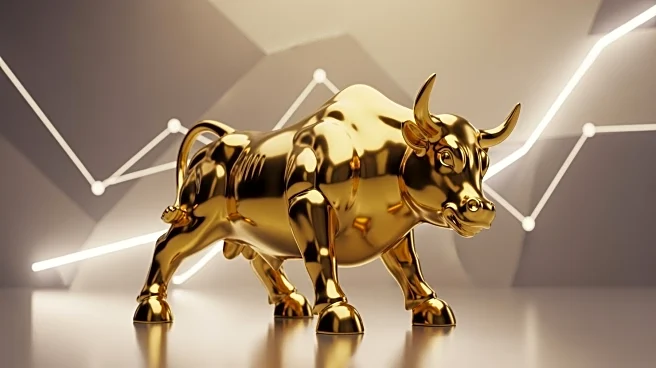What's Happening?
The Dow Jones Industrial Average closed above 47,000 for the first time, driven by better-than-expected inflation data. The Consumer Price Index data for September showed inflation rising less than anticipated,
boosting investor confidence and leading to a stock market rally. The Dow gained 473 points, or 1.01%, closing at 47,207.12. The S&P 500 and Nasdaq also saw significant gains, with the Nasdaq posting a 1.15% increase. Wall Street's fear gauge, the VIX, decreased by 5%, indicating reduced market volatility. The Federal Reserve is expected to cut interest rates at its upcoming meetings, further encouraging investment and spending.
Why It's Important?
The stock market rally signifies strong investor confidence in the U.S. economy, particularly in light of the Federal Reserve's anticipated interest rate cuts. Lower rates typically stimulate economic activity by reducing borrowing costs, which can lead to increased consumer spending and business investment. This development is crucial for maintaining the current bull market, as corporate earnings continue to impress investors. Companies like Ford have reported strong earnings, contributing to the positive market sentiment. The rally also reflects optimism about U.S.-China trade relations, with President Trump and Chinese leader Xi Jinping expected to meet soon.
What's Next?
Investors will be closely monitoring upcoming corporate earnings reports from major companies such as Microsoft and Apple. Additionally, the Federal Reserve's policy decisions next week will be pivotal in shaping market dynamics. The anticipated rate cuts could further bolster the stock market, although geopolitical factors, including U.S.-China trade discussions, will also play a significant role. The market's response to these developments will be crucial in determining the sustainability of the current bull market.
Beyond the Headlines
The stock market's performance is not only a reflection of economic indicators but also of broader geopolitical and trade dynamics. The meeting between President Trump and Xi Jinping could have significant implications for global trade policies, potentially affecting market stability. Furthermore, the Federal Reserve's actions are closely tied to broader economic health, with interest rate decisions impacting inflation and employment rates. The interplay between these factors will continue to shape investor sentiment and market trends.









